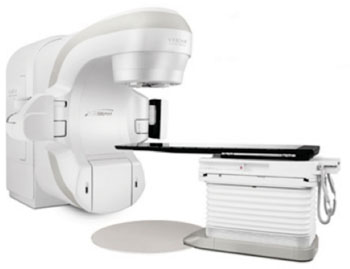Software Tools Designed to Augments Quality Assurance Processes in Radiation Oncology Procedures
|
By MedImaging International staff writers Posted on 04 Aug 2014 |

Image: The Varian TrueBeam system (Photo courtesy of Varian).
New tools that facilitate knowledge sharing, as well as recent enhancements to an advanced cancer treatment system for image-guided radiotherapy and radiosurgery have recently been developed.
Varian Medical Systems (Palo Alto, CA, USA) presented tools designed to augment essential quality assurance processes in radiation oncology at the 2014 annual meeting of the American Association of Physicists in Medicine (AAPM). During the meeting, which took place July 20–24, 2014, in Austin (TX, USA), Varian also highlighted applications for knowledge sharing, as well as recent enhancements to the TrueBeam system for image-guided radiotherapy and radiosurgery.
Machine performance check (MPC), a new service tool for use with Varian’s TrueBeam system, is among the tools that will be showcased. A fully automated test sequence that acquires 40 images and completes 18 tests in about five minutes, MPC helps medical physicists determine that the TrueBeam system is operating within specified parameters prior to treatment.
“The TrueBeam system incorporates several tightly integrated subsystems, including the gantry, which rotates around the patient; the multileaf collimator, which shapes the treatment beam; the treatment couch, which is used to position the patient for treatment; and two imagers for fine-tuning tumor targeting and verifying the dose delivered,” said Todd Holmes, product manager. “MPC enables a user to quickly establish that each of these components is performing accurately, so that clinicians can deliver highly precise treatments like stereotactic radiosurgery with confidence. It also conducts a constancy check of the treatment beam to verify that it is stable over time. The test can be completed quickly, in a way that is easily integrated into daily clinical processes.”
Varian also presented Qumulate QA, a cloud-based quality assurance (QA) data management and analysis tool. A works-in-progress that is not yet available for sale, Qumulate is designed to allow medical physicists to maintain linear accelerator (linac) QA data through a simple and intuitive web interface. Using this web-based tool, users will be able to create QA templates reflecting their own clinic-specific testing procedures, identify trends in a linac’s historical test performance, and see how their own machine compares to the QA performance of other linacs. All the data will be analyzed in the cloud.
“Not only will Qumulate help alleviate the QA paperwork burden, it may also help standardize the QA process with the ultimate goal of delivering the highest quality of care to the patient,” said Sukhveer Singh, vice president of Varian’s oncology continuum solutions group. “We’re excited to share this latest innovation designed to facilitate greater knowledge sharing among users.”
Other knowledge-sharing tools exhibited included: (1) RapidPlan knowledge-based treatment planning software, which enables clinicians to leverage knowledge and data from earlier treatment plans to quickly develop high-quality personalized plans for patients. (2) Velocity software for accessing and aggregating treatment and imaging data from diverse systems to show a comprehensive view of a patient’s diagnostic history, regardless of where they were treated or what technology was used.
“The ongoing development of these software products is part of an important initiative we launched last year, to focus on solutions that promote evidence-based care and help to enhance quality, consistency, and efficiency in clinical processes related to radiotherapy and radiosurgery,” said Kolleen Kennedy, president of Varian’s oncology systems business. “We are pleased to share some of these tools, plus other refinements of our major cancer treatment delivery systems, with clinicians attending this year’s AAPM meeting.”
“We’re delighted to see this level of knowledge sharing about Varian technology going on at the 2014 AAPM meeting,” Ms. Kennedy added. “The level of activity helps bring us a step closer to our vision of a world without fear of cancer.”
Related Links:
Varian Medical Systems
Varian Medical Systems (Palo Alto, CA, USA) presented tools designed to augment essential quality assurance processes in radiation oncology at the 2014 annual meeting of the American Association of Physicists in Medicine (AAPM). During the meeting, which took place July 20–24, 2014, in Austin (TX, USA), Varian also highlighted applications for knowledge sharing, as well as recent enhancements to the TrueBeam system for image-guided radiotherapy and radiosurgery.
Machine performance check (MPC), a new service tool for use with Varian’s TrueBeam system, is among the tools that will be showcased. A fully automated test sequence that acquires 40 images and completes 18 tests in about five minutes, MPC helps medical physicists determine that the TrueBeam system is operating within specified parameters prior to treatment.
“The TrueBeam system incorporates several tightly integrated subsystems, including the gantry, which rotates around the patient; the multileaf collimator, which shapes the treatment beam; the treatment couch, which is used to position the patient for treatment; and two imagers for fine-tuning tumor targeting and verifying the dose delivered,” said Todd Holmes, product manager. “MPC enables a user to quickly establish that each of these components is performing accurately, so that clinicians can deliver highly precise treatments like stereotactic radiosurgery with confidence. It also conducts a constancy check of the treatment beam to verify that it is stable over time. The test can be completed quickly, in a way that is easily integrated into daily clinical processes.”
Varian also presented Qumulate QA, a cloud-based quality assurance (QA) data management and analysis tool. A works-in-progress that is not yet available for sale, Qumulate is designed to allow medical physicists to maintain linear accelerator (linac) QA data through a simple and intuitive web interface. Using this web-based tool, users will be able to create QA templates reflecting their own clinic-specific testing procedures, identify trends in a linac’s historical test performance, and see how their own machine compares to the QA performance of other linacs. All the data will be analyzed in the cloud.
“Not only will Qumulate help alleviate the QA paperwork burden, it may also help standardize the QA process with the ultimate goal of delivering the highest quality of care to the patient,” said Sukhveer Singh, vice president of Varian’s oncology continuum solutions group. “We’re excited to share this latest innovation designed to facilitate greater knowledge sharing among users.”
Other knowledge-sharing tools exhibited included: (1) RapidPlan knowledge-based treatment planning software, which enables clinicians to leverage knowledge and data from earlier treatment plans to quickly develop high-quality personalized plans for patients. (2) Velocity software for accessing and aggregating treatment and imaging data from diverse systems to show a comprehensive view of a patient’s diagnostic history, regardless of where they were treated or what technology was used.
“The ongoing development of these software products is part of an important initiative we launched last year, to focus on solutions that promote evidence-based care and help to enhance quality, consistency, and efficiency in clinical processes related to radiotherapy and radiosurgery,” said Kolleen Kennedy, president of Varian’s oncology systems business. “We are pleased to share some of these tools, plus other refinements of our major cancer treatment delivery systems, with clinicians attending this year’s AAPM meeting.”
“We’re delighted to see this level of knowledge sharing about Varian technology going on at the 2014 AAPM meeting,” Ms. Kennedy added. “The level of activity helps bring us a step closer to our vision of a world without fear of cancer.”
Related Links:
Varian Medical Systems
Latest Imaging IT News
- New Google Cloud Medical Imaging Suite Makes Imaging Healthcare Data More Accessible
- Global AI in Medical Diagnostics Market to Be Driven by Demand for Image Recognition in Radiology
- AI-Based Mammography Triage Software Helps Dramatically Improve Interpretation Process
- Artificial Intelligence (AI) Program Accurately Predicts Lung Cancer Risk from CT Images
- Image Management Platform Streamlines Treatment Plans
- AI-Based Technology for Ultrasound Image Analysis Receives FDA Approval
- AI Technology for Detecting Breast Cancer Receives CE Mark Approval
- Digital Pathology Software Improves Workflow Efficiency
- Patient-Centric Portal Facilitates Direct Imaging Access
- New Workstation Supports Customer-Driven Imaging Workflow
Channels
Radiography
view channel
Machine Learning Algorithm Identifies Cardiovascular Risk from Routine Bone Density Scans
A new study published in the Journal of Bone and Mineral Research reveals that an automated machine learning program can predict the risk of cardiovascular events and falls or fractures by analyzing bone... Read more
AI Improves Early Detection of Interval Breast Cancers
Interval breast cancers, which occur between routine screenings, are easier to treat when detected earlier. Early detection can reduce the need for aggressive treatments and improve the chances of better outcomes.... Read more
World's Largest Class Single Crystal Diamond Radiation Detector Opens New Possibilities for Diagnostic Imaging
Diamonds possess ideal physical properties for radiation detection, such as exceptional thermal and chemical stability along with a quick response time. Made of carbon with an atomic number of six, diamonds... Read moreMRI
view channel
New MRI Technique Reveals Hidden Heart Issues
Traditional exercise stress tests conducted within an MRI machine require patients to lie flat, a position that artificially improves heart function by increasing stroke volume due to gravity-driven blood... Read more
Shorter MRI Exam Effectively Detects Cancer in Dense Breasts
Women with extremely dense breasts face a higher risk of missed breast cancer diagnoses, as dense glandular and fibrous tissue can obscure tumors on mammograms. While breast MRI is recommended for supplemental... Read moreUltrasound
view channel
New Incision-Free Technique Halts Growth of Debilitating Brain Lesions
Cerebral cavernous malformations (CCMs), also known as cavernomas, are abnormal clusters of blood vessels that can grow in the brain, spinal cord, or other parts of the body. While most cases remain asymptomatic,... Read more.jpeg)
AI-Powered Lung Ultrasound Outperforms Human Experts in Tuberculosis Diagnosis
Despite global declines in tuberculosis (TB) rates in previous years, the incidence of TB rose by 4.6% from 2020 to 2023. Early screening and rapid diagnosis are essential elements of the World Health... Read moreNuclear Medicine
view channel
New Imaging Approach Could Reduce Need for Biopsies to Monitor Prostate Cancer
Prostate cancer is the second leading cause of cancer-related death among men in the United States. However, the majority of older men diagnosed with prostate cancer have slow-growing, low-risk forms of... Read more
Novel Radiolabeled Antibody Improves Diagnosis and Treatment of Solid Tumors
Interleukin-13 receptor α-2 (IL13Rα2) is a cell surface receptor commonly found in solid tumors such as glioblastoma, melanoma, and breast cancer. It is minimally expressed in normal tissues, making it... Read moreGeneral/Advanced Imaging
view channel
First-Of-Its-Kind Wearable Device Offers Revolutionary Alternative to CT Scans
Currently, patients with conditions such as heart failure, pneumonia, or respiratory distress often require multiple imaging procedures that are intermittent, disruptive, and involve high levels of radiation.... Read more
AI-Based CT Scan Analysis Predicts Early-Stage Kidney Damage Due to Cancer Treatments
Radioligand therapy, a form of targeted nuclear medicine, has recently gained attention for its potential in treating specific types of tumors. However, one of the potential side effects of this therapy... Read moreIndustry News
view channel
GE HealthCare and NVIDIA Collaboration to Reimagine Diagnostic Imaging
GE HealthCare (Chicago, IL, USA) has entered into a collaboration with NVIDIA (Santa Clara, CA, USA), expanding the existing relationship between the two companies to focus on pioneering innovation in... Read more
Patient-Specific 3D-Printed Phantoms Transform CT Imaging
New research has highlighted how anatomically precise, patient-specific 3D-printed phantoms are proving to be scalable, cost-effective, and efficient tools in the development of new CT scan algorithms... Read more
Siemens and Sectra Collaborate on Enhancing Radiology Workflows
Siemens Healthineers (Forchheim, Germany) and Sectra (Linköping, Sweden) have entered into a collaboration aimed at enhancing radiologists' diagnostic capabilities and, in turn, improving patient care... Read more




















